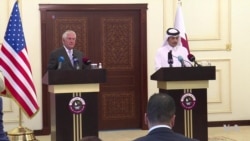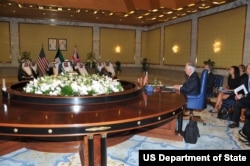Despite temperatures soaring above 50 Celsius in Kuwait City, U.S. Secretary of State Rex Tillerson scored a first tentative victory for cool diplomacy on his push to help find a resolution to the month-long blockade of Qatar by its Persian Gulf neighbors.
Standing beside Qatari Foreign Minister Mohammed bin Abdulrahman al-Thani, Tillerson announced the United States and Qatar have signed a memorandum of understanding for Doha to take steps to curb terrorism financing.
“I am here in Qatar today carrying with me the same spirit which President Trump traveled in Riyadh with in May," he said. "The United States has one goal: drive terrorism off the face of the earth.”
The secretary of state shuttled between Kuwait City and the Qatari capital, Doha, Tuesday, and plans to head to the Saudi city of Jeddah on Wednesday "to meet with the parties who are on the other side of this issue...to explore their feelings and explore options for how we might move this forward."
Brokering a crisis
On June 5, Saudi Arabia, the United Arab Emirates, Bahrain, Egypt and others severed diplomatic ties and instituted a land, air and sea blockade of Qatar. The Saudi-led group of Arab nations has accused Qatar of supporting terrorism and has given Doha a list of 13 demands.Qatar has said it is willing to negotiate, but will not give up its sovereignty.
Although President Donald Trump early on appeared to come down on the side of Saudi Arabia, accusing Qatar of funding terrorism at the highest levels, many analysts say Tillerson has made an effort to be an honest broker in the crisis.
“I think Qatar has been quite clear in its positions, and I think those have been very reasonable,” he said.
The U.S. is concerned the dispute could hurt its military and counterterrorism operations and enhance Iran's influence in the region. Qatar hosts the largest U.S. military facility in the Middle East, which aircraft from the U.S.-led coalition use to launch attacks against Islamic State militants in Iraq and Syria.
Aaron David Miller, a former advisor to both Republican and Democratic secretaries of state on Arab-Israeli negotiations, told VOA Tillerson's success on this "shuttle diplomacy" mission could unite the secretary and Trump.
Necessary skills
“If Tillerson can deliver something that allows the Saudis and Qataris to back away from this without either being humiliated, then I think the President would welcome and support it," Miller noted. "If however you end up in a situation where the Saudis walk away embittered, concerned that Tillerson has pushed them too hard, then I think it’s going to be hard.”
Miller, a fellow with the Wilson Center in Washington, said that he believes Tillerson, as the former head of Exxon, has the required skills to negotiate a deal.
“Tillerson is familiar with this part of the world, particularly the Gulf. So I think people respect him," Miller said. "You know he’s straight out of central casting with respect to looking like a secretary of state, but it’s very important, clearly was important to the president and your persona is critically important.”
But some analysts are concerned many in the Persian Gulf and in the broader Middle East are unsure Tillerson speaks for his boss.
Kemal Kirisci, a Turkey analyst at Brookings Institution, says there is a great deal of confusion about U.S. goals.
“I suspect the general feeling in the region is one that is probably not different than the rest of the world - a state of confusion over what American foreign policy is and also a sense of nervousness about the uncertainty that engulfs American foreign policy at the moment and question marks on whether Tillerson actually represents that foreign policy given the way which sometimes what he says and his remarks do not always overlap with those of the president of the United States, Donald Trump,” he said.
Several analysts say the president needs to make clear Tillerson has his full support for the secretary to succeed.






